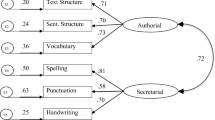Abstract
Writing samples of children in grades one through three were collected in two midwestern elementary schools using the Picture Story Language Test. Each story was scored for productivity, syntax, and level of abstraction. Results indicated that performance in all aspects of written language improved with age.
A second study was conducted to compare the writing of normal children who were average readers in grades one through three with learning disabled children who were reading at comparable levels. The results indicated no significant differences in productivity but there were differences in syntax. Problems were noted particularly in morphology. Further observations indicated the learning disabled poor readers also had more problems with handwriting and spelling than average readers.
Similar content being viewed by others
References
Aaron, P. G. and Phillips, S. 1986. A decade of research with dyslexic college students: A summary of findings.Annals of Dyslexia 36:44–65.
Applebee, A. N. 1978.The Child’s Concept of Story. Chicago: The University of Chicago Press.
Beers, J. and Henderson, E. 1980.Developmental and Cognitive Aspects of Learning to Spell. Newark, DE: International Reading Association.
Bereiter, C. 1980. Toward a developmental theory of writing.In L. Gregg and R. Steinberg (eds.).Cognitive Processes in Writing. Hillsdale, NJ: L. Erlbaum.
Bissex, G. L. 1980.Gnus at Wrk: A Child Learns to Write and Read. Cambridge: Harvard University Press.
Bock, K. J. 1982. Toward a cognitive psychology of syntax: Information processing contributions to sentence formation.Psychological Review 89(1):1–47.
Bryant, P., and Bradley, M. 1980. Why children sometimes write words which they do not read.In U. Frith (ed.).Cognitive Processes in Spelling. New York: Academic Press.
Carlisle, J. F. 1987. The use of morphological knowledge in spelling derived forms by learning disabled and normal students.Annals of Dyslexia 37:90–108.
Critchley, M. 1973. Some problems of the ex-dyslexic.Bulletin of the Orton Society 23:7–14.
Frederiksen, C. and Dominic, J. (eds.). 1981.Writing: The nature, development and teaching of written communication (vol. 2). Hillsdale, NJ: Erlbaum.
Frith, U. (ed.). 1980.Cognitive Processes in Spelling. New York: Academic Press.
Gibson, E. J. and Guinet, L. 1971. Perception of inflections in brief visual presentations of words.Journal of Verbal Learning and Verbal Behavior 10:182–189.
Gillingham, A. and Stillman, B. W. 1973.Remedial Training for Children with Specific Disability in Reading, Spelling, and Penmanship. Cambridge, MA: Educators Publishing Service, Inc.
Goldstein, K. 1948.Language and Language Disturbances. New York: Grune and Stratton.
Graves, D. H. 1985. All children can write.Learning Disabilities Focus 1(1):36–43.
Gregg, L. and Steinberg, R. (eds.). 1980.Cognitive Processes in Writing. Hillsdale, NJ: Erlbaum.
Halliday, M. and Hasan, R. 1976.Cohesion in English. London: Longman.
Hammill, D. and Larsen, D. 1981.Test of Written Language. Austin, TX: Pro-Ed.
Jastak, J. F. and Jastak, S. 1978.The Wide Range Achievement Test. Wilmington DE: Jastak Associates, Inc.
Johnson, D. and Blalock, J. W. (eds.). 1987.Adults with Learning Disabilities: Clinical Studies, (pp. 173–203). Orlando, FL: Grune and Stratton.
Johnson, D. and Myklebust, H. 1967.Learning Disabilities: Educational Principles and Practices. New York: Grune and Stratton.
Kean, M. L. 1977. The linguistic interpretation of aphasic syndromes. Agrammatism in Broca’s aphasia, an example.Cognition 5:9–46.
Liberman, I. Y., Rubin, H., Duques, S., and Carlisle, J. 1985. Linguistic abilities and spelling proficiency in kindergarteners and adult poor spellers.In D. B. Gray and J. F. Kavanagh (eds.).Biobehavioral Measures of Dyslexia. Parkton, MD: York Press.
Litowitz, B. 1981. Developmental issues in written language.Topics in Language Disorders 1:73–89.
Moats, L. C. 1983. A comparison of the spelling errors of older dyslexic and second-grade normal children.Annals of Dyslexia 33:121–139.
Morris, N. T. and Crump W. D. 1982. Syntactic and vocabulary development in the written language of learning disabled and non-learning disabled students at four age levels.Learning Disability Quarterly 5(2):163–172.
Myklebust, H. 1965.Development and Disorders of Written Language (vol. 1). New York: Grune and Stratton.
Mykelbust, H. 1973.Development and Disorders of Written Language (vol. 2). New York: Grune and Stratton.
Nystrand, M. (ed.). 1982.What Writers Know: Language, process, and structure of written discourse. New York: Academic Press.
Orton, S. T. 1937.Reading, Writing and Speech Problems in Children. New York: W. W. Norton.
Rawson, M. 1968.Developmental Language Disability: Adult accomplishments of dyslexic boys. Baltimore: Johns Hopkins Press.
Read, C. 1986.Children’s Creative Spelling. London: Routledge and Kegan Paul.
Rubin, H. and Liberman, I. 1983. Exploring the oral and written language errors made by language disabled children.Annals of Dyslexia 33:111–120.
Temple, C., Nathan, R., and Burris, N. 1982.The Beginnings of Writing. Boston: Allyn and Bacon.
Vellutino, F. 1977. Alternative conceptualizations of dyslexia: Evidence in support of a verbal-deficit hypothesis.Harvard Educational Review, 47:334–354.
Vogel, S. A. 1975.Syntactic Abilities in Normal and Dyslexic Children. Baltimore: University Park Press.
Vogel, S. 1986. Syntactic complexity in written expression of LD college writers.Annals of Dyslexia 35:137–157.
Wing, S. and Baddelly, A. 1980. Memory and spelling.In U. Frith (ed.).Cognitive Processes in Spelling. New York: Academic Press.
Author information
Authors and Affiliations
Rights and permissions
About this article
Cite this article
Johnson, D.J., Grant, J.O. Written narratives of normal and learning disabled children. Annals of Dyslexia 39, 140–158 (1989). https://doi.org/10.1007/BF02656906
Issue Date:
DOI: https://doi.org/10.1007/BF02656906




